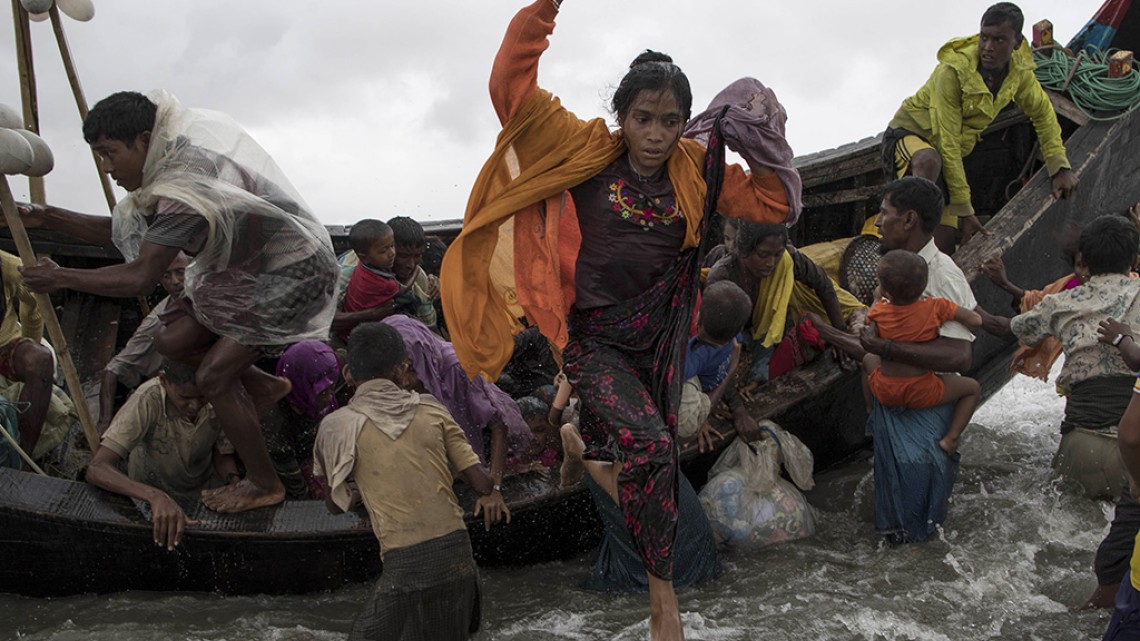
Rohingya refugees arriving in Bangladesh Sept. 12, 2017.
Events seek to untangle roots of Rohingya crisis
By
In recent months, roughly half the 1.1 million Rohingya Muslims living in Myanmar have fled their homes in response to what United Nations officials have labeled “ethnic cleansing.” Two upcoming events will attempt to shed light on the crisis.
The first is a lecture by Gayatri Spivak, Ph.D. ’67, University Professor and professor of English and comparative literature at Columbia University. Her talk, “The Rohingya Issue in a Global Context,” will take place Oct. 30 at 4:30 p.m. in Hollis E. Cornell Auditorium, Goldwin Smith Hall.
Spivak is a well-known literary and postcolonial theorist and feminist critic.
On Nov. 7, a roundtable called “The Roots of the Rohingya Crisis: The Eradication of a Myanmar Ethnic Group” will feature Michael W. Charney, Myanmar scholar and professor at the School of Oriental and African Studies, University of London, along with Burmese human rights researcher Eaint Thiri Thu and Cornell associate professor of anthropology Magnus Fiskesjö.
The roundtable will take place at 4:30 p.m. in Rhodes-Rawlings Auditorium, Klarman Hall.
The series is organized by the Collective of Concerned Students on Global Issues and supported by the Mario Einaudi Center for International Studies, the Southeast Asia Program, the South Asia Program, the Comparative Muslim Societies Program, and faculty whose work focuses on Myanmar.
The Rohingya are a largely Muslim minority group living in Rakhine state in western Myanmar, a country that is nearly 90 percent Buddhist. Denied citizenship by law, the Rohingya are often described as the most persecuted minority in the world.
On Aug. 23, Kofi Annan, former secretary-general of the United Nations, delivered recommendations to the president of Myanmar on how to improve conditions for all inhabitants of Rakhine state. Three weeks later, top U.N. officials declared that the Rohingya refugee crisis amounted to ethnic cleansing.
The exodus began after attacks on security personnel by the Arakan Rohingya Salvation Army in October 2016 led to security operations in northern parts of the state. Recent news reports, refugee accounts and satellite images point to brutal treatment of civilian Rohingya by the Myanmar military, including the burning of many villages.
Hastily built camps are unable to meet the needs of internally displaced people or those who have crossed into Bangladesh, India or Malaysia. The refugees suffer from lack of food, shelter and medicine. Bangladesh is now building a mega-camp for 800,000 people to house new refugees along with those who arrived during previous expulsions.
The mass displacement of Rohingya comes at a time of increasingly virulent Buddhist nationalism in South and Southeast Asia. It also occurs in a context of growing American, Chinese, Indian and Russian interests in Myanmar’s natural resources and strategic Indian Ocean ports.
Nobel Peace Prize winner Aung San Suu Kyi, Myanmar’s de facto leader, was once seen as a shining light of democracy, but recent events have provoked a reassessment of her image.
Her government has denied accusations of ethnic cleansing, claiming that this is a problem of national sovereignty, and that the actions of the military are in defense against terrorism. The government says it will investigate the crisis, allow access to aid groups and welcome refugees to return. However, these promises have yet to be put into practice.
Geethika Dharmasinghe is a graduate student in the field of Asian literature, religion and culture, and a member of the Collective of Concerned Students on Global Issues.
Media Contact
Get Cornell news delivered right to your inbox.
Subscribe